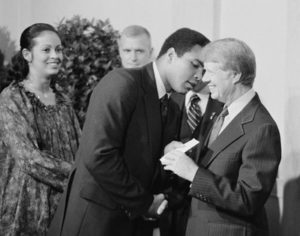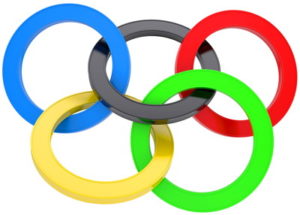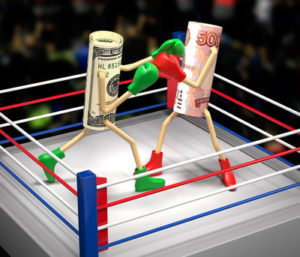Do Fixed Boxing Matches Still Happen?
 In its most basic sense, there is no sport purer than boxing. It puts two athletes up against one another, throwing punches to try and knock the other out. If one of them succeeds in this aim then they win the fight and the boxer that gets knocked out loses it. It really is that simple. Of course, the reality of boxing matches is much more complex than that, given that there is no guarantee that either boxer will actually be able to knock the other out. As a result, there is a need for others to be involved in the decision-making, specifically judges.
In its most basic sense, there is no sport purer than boxing. It puts two athletes up against one another, throwing punches to try and knock the other out. If one of them succeeds in this aim then they win the fight and the boxer that gets knocked out loses it. It really is that simple. Of course, the reality of boxing matches is much more complex than that, given that there is no guarantee that either boxer will actually be able to knock the other out. As a result, there is a need for others to be involved in the decision-making, specifically judges.
This added dimension means that bouts can be decided by something other than the sheer athleticism and skill of those taking part in the fight. Judges can be open to bribery, whilst the boxers themselves are far from perfect. A large sum of money from a dodgy consortium can persuade any fighter to go down in the round that they’ve been instructed to, for example. It means that boxing, perhaps more than most other sports, is likely to suffer some controversy and has done precisely that over the years, even if it can’t always be proven.
What We Mean By ‘Fixed’

Before we get into the details of the matches that may have been fixed over the years, it is important to outline what it is that we mean by that phrase. In essence, it is a reference to when a fight is decided by something other than the ability of the two boxers taking part in the event. Perhaps one of the boxers has been paid money to be ‘knocked out’ in a specific round, hitting the deck after a punch and failing to get up in time. Maybe a judge or several judges have been paid to award a fight to one fighter over another at the end of a bout.
Match referees can also be paid money to make a decision, of course. They could end the fight earlier than most will have thought it should have been ended, or accuse a fighter of behaving in a way that means that they need to be docked points. All in all, it is about fights not being allowed to follow their natural course for one reason or another and the subsequent result being false as a result of that. The problem is, such things aren’t always easy to prove and therefore the result stands, even if everyone is suspicious about it.
A Tale As Old As Time

As long ago as 1890, a correspondent for the San Fransisco Call accused a boxer of taking a dive during a match. The report says,
“George Mullholland disappointed the members of the San Jose Athletic Club las Thursday. A correspondent says that he could have defeated his opponent, Wiley Evans, easily, but that he accepted a bribe, thereby ‘throwing down’ the men who released him from prison a few weeks ago.”
As far as we can tell, that is the oldest reference to a boxer throwing a match for financial reasons.
There are countless similar stories throughout the early part of the 20th century, such as in 1913 when the then-World White Heavyweight Champion, Arthur Pelkey, submitted a letter to the sports editor of The Oregonian, saying that he had been involved in a fixed match. The bout in question took placed in Canada on the 26th of March that year, with his manager, Tommy Burns, instructing him to hit the deck easily. Even so, he continued to work with Burns as his manager after the fact, perhaps fixing more matches after that.
The Film-Worthy Story

The example of Vince Martinez in 1954 is one that could have been the plot of a film. A young, up-and-coming fighter, 25-year-old Martinez was offered $20,000 to lose his fight to Carmine Fiore, which was due to take place at Madison Square Garden. His biggest purse to that point was $20,000, so it was no small offer that was made to him as he finished his road training in New Jersey two days before the fight. A talented fighter, Martinez was eligible for a title fight against Johnny Saxton that would have been worth $150,000.
Knowing that his chance might evade him if he lost, Martinez refused but was threatened with violence as a result. After seeking advice from his brother Phil, Martinez called the New York State Athletic Commission, who were responsible for organising the fight, and told them about the offer and the threat. They provided him with an unobtrusive bodyguard, who was even present in Madison Square Garden as the national anthem was sung before the fight. During the bout it was all Martinez, using his jab to keep his opponent at bay.
By the time the seventh round came about, Fiore was too tired to put up much resistance and Martinez landed blow after blow on his opponent. The referee stopped the fight, with Martinez and his entourage being given protection from the District Attorney’s office as they left the Garden and headed for his hometown of New Jersey. For his part, Martinez knew that he couldn’t lose the fight on account of the fact that word might get out that he’d been offered a bribe and the subsequent belief that he’d taken it, so he fought for his reputation as well as his career.
Muhammad Ali

Trikosko, Marion S., photographer, Public domain, via Wikimedia Commons
To most boxing fans, the idea that Muhammad Ali might have taken a bribe is sacrilegious. Considered ‘The Greatest’ by many, Ali was believed to be a man of integrity, as proved by his refusal to be drafted into the military during the Vietnam War. Even so, it was alleged by the Federal Bureau of Investigation that Ali’s first fight against Sonny Liston might have been fixed. It was believed that a figure close to organisation crime and Liston himself had been involved in fixing the match, though there is scant proof that it actually happened.
Even today, however, it is difficult for anyone watching the footage of the fight to see how the punch that Ali threw managed to knock Liston out, given it didn’t seem to touch him. There is no suggestion that Ali knew the fight was being fixed, but the same can’t be said of his bout with Antonio Inoki in 1976. It took place at the Nippon Budokan in Tokyo, with both sides having agreed to the match on the understanding that it would be a fixed exhibition bout. Because neither side could agree who should win, it turned into a genuine fight that ended up as a 15-round draw.
The Olympic Fixes
 In the 2012 Summer Olympics, Japan’s Satoshi Shimizu was taking on Magomed Abdulhamidov of Azerbaijan in the bantamweight fight. As the fight reached its final round, Shimizu was trailing his opponent 12-5 but put in an awesome performance, knocking him down five times. Abdulhamidov was also given a two-point penalty, with the judges ended up scoring the round as a 12-10 win for Shimizu. That wasn’t enough for him to win the fight, which left the Japanese boxer ‘shocked’ in the wake of the fight.
In the 2012 Summer Olympics, Japan’s Satoshi Shimizu was taking on Magomed Abdulhamidov of Azerbaijan in the bantamweight fight. As the fight reached its final round, Shimizu was trailing his opponent 12-5 but put in an awesome performance, knocking him down five times. Abdulhamidov was also given a two-point penalty, with the judges ended up scoring the round as a 12-10 win for Shimizu. That wasn’t enough for him to win the fight, which left the Japanese boxer ‘shocked’ in the wake of the fight.
Though knockdowns don’t earn extra points, the verdict that saw Abdulhamidov declared the winner was greeted with boos in London. Japanese officials went to the competition office and paid the $500 needed to lodge an appeal, which was eventually won. The referee, Turkmenistan’s Ishanguly Meretnyyazov, was expelled from the competition by the International Boxing Association. This is because the AIBA rules state that a mandatory eight count and three knockdowns should have resulted in the referee ending the match.
Four years later and boxing at the Olympics was in the news once again. This time it was thanks to a news report in Sports Illustrated that stated that a number of judges and referees had been sent home from host city Rio after a wealth of decisions had come under suspicion. A statement from the AIBA read, “The concerned referees and judges will no longer officiate at the Rio 2016 Olympic Games. AIBA will not shy away from its responsibilities and is fully committed… [to] always acting in the boxers’ utmost interest. One trainer and commentator suggested that NBC in America didn’t show Olympic boxing in order to hide the corruption on display from the public.
What Happens To Money Bet On Fixed Matches?
 Knowing that corruption takes place in a sport like boxing is one thing, but figuring out what happens to the bets that are placed on such events is something else entirely. In most cases, bookmakers settle results as they are officially recorded, meaning that you’ll be paid out if you placed a bet on the winner even if it is later discovered that the match was fixed. If you placed a wager on the loser, you will soon find that your stake money has been taken as a losing bet by the company with which you decided to place it, even if it transpires that they lost unfairly.
Knowing that corruption takes place in a sport like boxing is one thing, but figuring out what happens to the bets that are placed on such events is something else entirely. In most cases, bookmakers settle results as they are officially recorded, meaning that you’ll be paid out if you placed a bet on the winner even if it is later discovered that the match was fixed. If you placed a wager on the loser, you will soon find that your stake money has been taken as a losing bet by the company with which you decided to place it, even if it transpires that they lost unfairly.
In such a situation, there is very little that you can do. You might wish to get in touch with the company that you placed your wager with, but they will likely point out that they paid out on the winning bets even though it turned out to be a fixed match, so it’s not fair on them to also have to pay out on losing bets given they can’t get the other money back. Some bookmakers might be generous and agree to pay you what would have been your winnings in the form of free bet tokens, but they don’t have to so probably won’t.
Paddy Power’s Generosity
 Was it generosity that led Paddy Power to paying out on both boxers when the fight between Jack Catterall and Josh Taylor ended in February of 2022, or was it nothing more than a publicity stunt? That is up to you to decide, but those that received a payout from the Flutter Entertainment owned company won’t care too much. It was a light-welterweight title fight between the two boxers that ended up going to the judges’ decisions, with Taylor awarded the win. That was a decision that earned criticism from pundits, boxers and fans alike.
Was it generosity that led Paddy Power to paying out on both boxers when the fight between Jack Catterall and Josh Taylor ended in February of 2022, or was it nothing more than a publicity stunt? That is up to you to decide, but those that received a payout from the Flutter Entertainment owned company won’t care too much. It was a light-welterweight title fight between the two boxers that ended up going to the judges’ decisions, with Taylor awarded the win. That was a decision that earned criticism from pundits, boxers and fans alike.
It was felt by most watching that Catterall had done enough to win and become the undisputed light-welterweight, but that wasn’t the way the decision ended up going. In a statement after the fight, Paddy Power said,
“First Everton were robbed of a blatant penalty, and then we’re fairly sure the same VAR official decides to rock up in Glasgow to score the Taylor v Catterall fight! Josh Taylor put on a great performance while trying to convince us he’d won, but we didn’t buy it and our customers shouldn’t have to either. We’re no stranger to looking after our customers and pride ourselves in our generosity when we see a hiccup happening that we deem to feel unfair for punters.”
The firm has long made a habit of paying out on what it feels are unfair decisions, such as at the end of the 2021 Grand Prix season when they paid out on both Max Verstappen and Lewis Hamilton to win the World Drivers Championship and the Abu Dhabi Grand Prix in the wake of the controversial end to Formula One. In similar fashion, they paid out on both Catterall and Taylor for this fight, which led to many punters heading to social media in order to ask other betting companies to follow their lead and do the same thing.
That the British Boxing Board of Control decided to initiate an investigation into the scoring of the fight after the fact tells you that something wasn’t right with what transpired. In the end, one of the judges was downgraded from an A Star Class to an A Class Official. To add a further twist to the tale, Jack Catterall’s MP in Chorley, the Speaker of the House of Commons Sir Lindsay Hoyle, sent a letter to the police asking them to investigate what happened. He said that everyone was ‘disgusted’ by what had happened and that the result ‘brings the sport into disrepute’.



